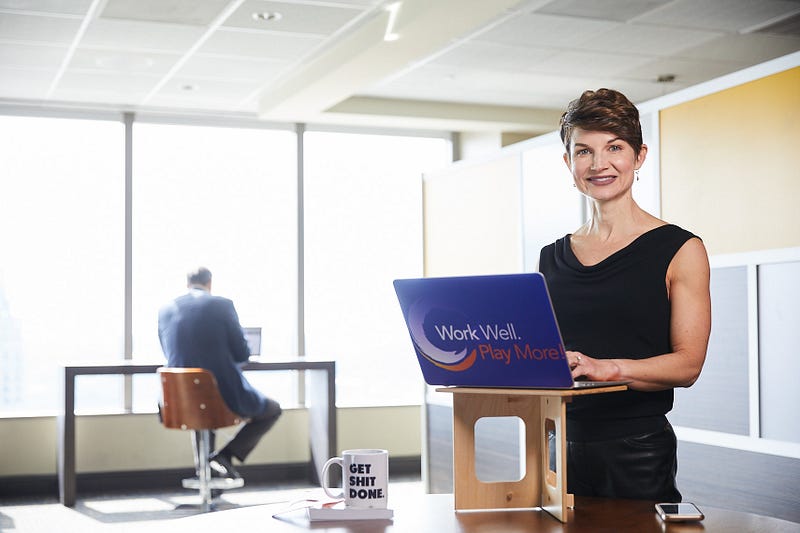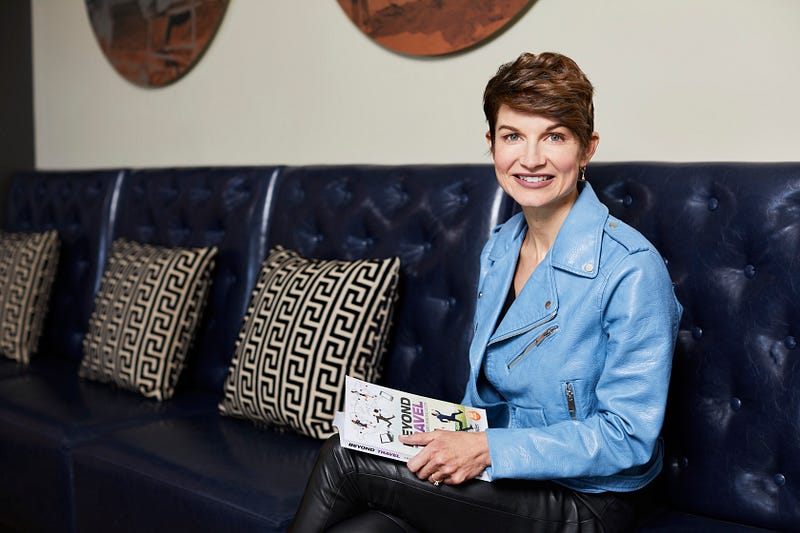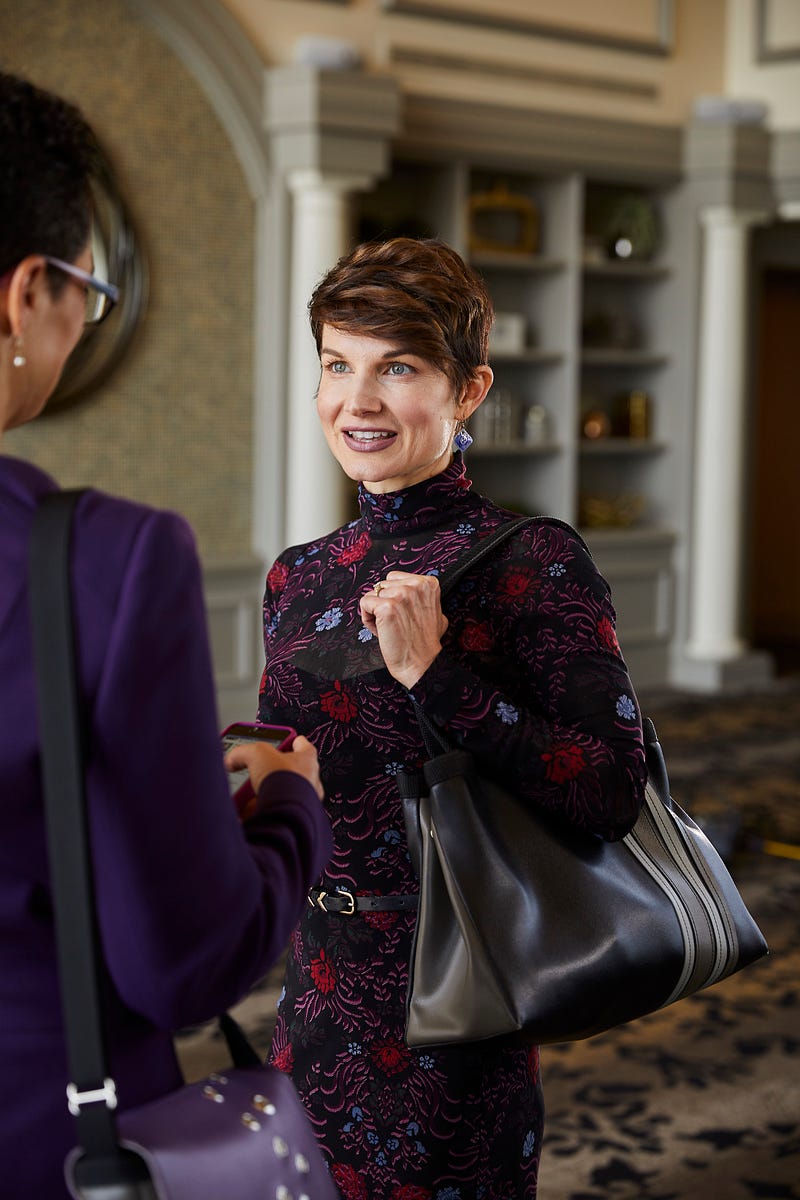It’s okay to just have a thought and do nothing. Boredom is where we are able to be creative. Four times a year I take an Information Vacation where I don’t learn anything. I read 50+ books a year plus listen to podcasts. During Information Vacations I don’t purposefully learn anything. We need time to put things into practice, not just go on to the next chapter.
As a part of my series about “How to Slow Down To Do More” I had the pleasure to interview Marcey Rader. Marcey is a Productivity and Health Expert and Founder of Work Well. Play More! where she helps individuals and business teams declutter their mind, body, and inbox one habit at a time. She’s an award-winning international speaker, executive coach, author, and online course creator. She is a catalyst to help people climb the ladder or build their business, without sacrificing their health.
Thank you so much for joining us! Can you tell us the “backstory” about what brought you to this specific career path?
I have multiple degrees and certifications in Exercise Science and nutrition, but spent 14 years in pharma research traveling up to 48 weeks a year. I worked my way up the ladder to management and was a corporate trainer. I realized how much I loved technology and processes and believe 100% that health and productivity go together. During all that travel, I completed over 100 ultra-endurance events and was continually asked how I did it all. About six months after starting my business, which at first focused only on business travelers, I was diagnosed with three autoimmune diseases and had been in menopause since the age of 36. This shifted my business to focus on helping people climb the ladder or build their business as a super woman or superman, without feeling like they need to be a superhero.
Work Well. Play More! Institute helps people extinguish email, conquer calendars, master tasks, and escalate their energy. We want them to work on their business, not busyness.
According to a 2006 Pew Research Report report, 26% of women and 21% of men feel that they are “always rushed”. Has it always been this way? Can you give a few reasons regarding what you think causes this prevalent feeling of being rushed?
One thing I help people create are boundaries. Our overwhelm is often due to our own habit of overcommitting or placing false urgency where there isn’t. For example, I always respond to emails within 24 hours. I have never been asked ‘did you receive that email?’ because I’ve never trained someone that I’m an immediate reactor. I also feel that managers have allowed themselves to become Siri. When direct reports have a question, they ask right then, often interrupting manager focus, even when it’s not urgent. We are an immediate gratification society. We want it right now because the access is always at our fingertips.
Based on your experience or research can you explain why being rushed can harm our productivity, health, and happiness?
When we feel rushed we create more mistakes. Our blood pressure and heart rate increase a little bit and over time that little bit becomes our new normal. Acting rushed also takes away our presence with people we are interacting with. If our minds are one step ahead, they can tell that we are trying to rush the conversation or activity.

On the flip side, can you give examples of how we can do more, and how our lives would improve if we could slow down?
I’m a big fan of taking lunch breaks. Stop eating all your meals in front of a screen. First, it doesn’t get imprinted on your brain that you’ve eaten so you aren’t satisfied and may end up eating up to 30% more calories later in the day. Second, taking 10–30 minutes to eat away from your desk can significantly increase your productivity in the afternoon, especially if you are outside in nature during that break. I’ve coached hundreds of individuals and teams, and this is one of the biggest challenges for them to change, but later results in huge wins. Not ONE has come back to me and said they regretted taking a lunch break. If stepping away doesn’t seem realistic, schedule 1–2 days a week away from your desk and have someone hold you accountable.
We all live in a world with many deadlines and incessant demands for our time and attention. That inevitably makes us feel rushed. Can you share with our readers 6 strategies that you use to “slow down to do more”? Can you please give a story or example for each?
1) OHIO email. I process email twice per day, and if I know from reading the subject line I can’t do anything with that email I immediately task it or snooze it, but I don’t open it and read it. Once I have read an email I do something with it right then — Delete, Delegate, Reply (if less than two minutes to do it), Archive or Task. Staying in my inbox isn’t an option. OHIO — Only Handle It Once.
2) I start each morning using the 5-minute journal app to write down what I’m grateful for. Then I meditate and take my heart rate variability, followed by a workout. It is a routine that I don’t give up, even when I’m on the road. I’m a morning person, and I don’t let anyone take away the time that sets me up for success.
3) I eat any meal I can with chopsticks. This forces me to slow down, and I have to look at the food I’m picking up.
4) I don’t schedule meetings to start and end on the hour. We all need biology breaks and time in between to take a few notes, get something to drink, or even just process what we’ve just discussed. My coaching sessions are 45-minutes, so I’m not rushed going into or out of a meeting.
5) Sunday prep! I set aside about 50 minutes on Sundays to food prep for the week and make all the family breakfasts, boil eggs, and make a couple of dishes to eat throughout the week. I also pick out my clothing and hang the outfits on hangers, so I’m not wasting any decisions in the mornings on what to wear.
6) Don’t fill your itinerary. I’m an active vacationer and used to fill up every minute. By keeping gaps in the days, I’m able to fill it with excursions or activities we just learned about or decide to do in-the-moment. It also gives us down time so we don’t feel like we need a rest day after vacation.

How do you define “mindfulness”? Can you give an example or story?
Mindfulness to me is the ability to be present or just think. Since knowledge is at our fingertips, we feel like we need to use every idle moment to get something done, but often it’s not even useful or helpful, like playing Candy Crush. It’s okay to just have a thought and do nothing. Boredom is where we are able to be creative. Four times a year I take an Information Vacation where I don’t learn anything. I read 50+ books a year plus listen to podcasts. During Information Vacations I don’t purposefully learn anything. We need time to put things into practice, not just go on to the next chapter.
Can you give examples of how people can integrate mindfulness into their everyday lives?
I practice the 4–6–8 breath every time I get into the car even if I’m running errands that are less than a mile apart. I breathe in for four counts, hold for six and breath out for eight. I do this for 4–6 cycles. It gets me relaxed if I get into the car feeling stressed or rushed and it’s a good reminder for me to do deep belly breaths.
Do you have any mindfulness tools that you find most helpful at work?
I made a Spotify playlist called Focus90 for a virtual co-working session I started. It’s all music that helps me focus and doesn’t have words. When I’m playing that with my noise-canceling headphones I know I am in Focus Mode. I don’t play it any other time of the day. I also use a self-hypnosis app and take as many phone calls as I can as walking meetings so I’m out in nature.
What are your favorite books, podcasts, or resources that inspire you to use mindfulness tools or practices
My favorite app is Calm.com. It has over 100 meditations, sleep stories, music and nature sounds, and mini-courses. I use self-hypnosis apps for sleep and Law of Attraction. I’m a big fan of heart rate variability and tracking parasympathetic and sympathetic nervous system stress. My favorite book is The Power of Less by Leo Babauta. It was life-changing for me.
Can you please give us your favorite “Life Lesson Quote”? Can you share how that was relevant to you in your life?
Talk Doesn’t Cook Rice is a Chinese Proverb that describes my philosophy on life. You can talk about cooking rice, but it isn’t going to feed you. Start boiling the water!

You are a person of great influence. If you could inspire a movement that would bring the most amount of good to the most amount of people, what would that be? You never know what your idea can trigger. 🙂
Movement Opportunities! People think that in order to be healthy they have to ‘exercise’ which means change clothes, get sweaty, maybe go to a gym or do something for a specific period of time. Instead, find something you do consistently every day….brush your teeth, take a shower, talk on the phone, and do something before, during or after, like push-ups, lunges, or squats, and that is your Movement Opportunity. Trigger — Behavior = Movement Opportunity.
Thank you so much for these insights! This was so inspiring!
About the Author:
After 15 years working in Commercial Real Estate in New York City, Ashley Graber changed the coast she lived on and the direction of her life from Real Estate to the worlds of Psychology and Meditation & Mindfulness. Ashley came to these practices after getting sober and in the decade plus since, she now runs a busy mindfulness based psychotherapy practice at Yale Street Therapy in Santa Monica, CA where she see adults and children and speaks on the benefits of meditation and mindfulness practices.
Ashley is an Owner and Director of Curriculum for the next generation meditation app & mindfulness company ‘Evenflow’ and launched the company’s one to one online mindfulness mentoring program. Ashley also educates teachers and administrators in schools and presents in businesses across Santa Monica and Los Angeles.
Ashley was trained in Meditation and Mindfulness practices by prominent teachers; Elisha Goldstein, Richard Burr and Guiding teacher at Against the Stream Boston, Chris Crotty. Her Mindfulness Based Stress Reduction (MBSR) certification was done through The Center for Mindfulness at UC San Diego. Additionally, Ashley is trained by Mindful Schools to teach Meditation and Mindfulness practices to children and families. Ashley’s unique combination of psychotherapy, trauma reprocessing and meditation and mindfulness practices make her a sought after therapist and mindfulness educator and speaker. Her passion for the benefits of mindfulness practices as well as her enthusiasm for helping young kids and adults is the drive to teach these very necessary, life long skills and why she wrote and runs the Mindfulness for Families program at The Center for Mindful Living. This is where she teaches groups of families with children ages 6–12. Ashley was featured on Good Morning LaLa Land, presented on Resilience at the renowned Wisdom. 2.0 Mindfulness & Technology conference, and presented at the TED Woman conference offering an in-depth look at the profound psychological and physiological consequences of chronic stress, and how meditation and mindfulness practices can alleviate these effects.


